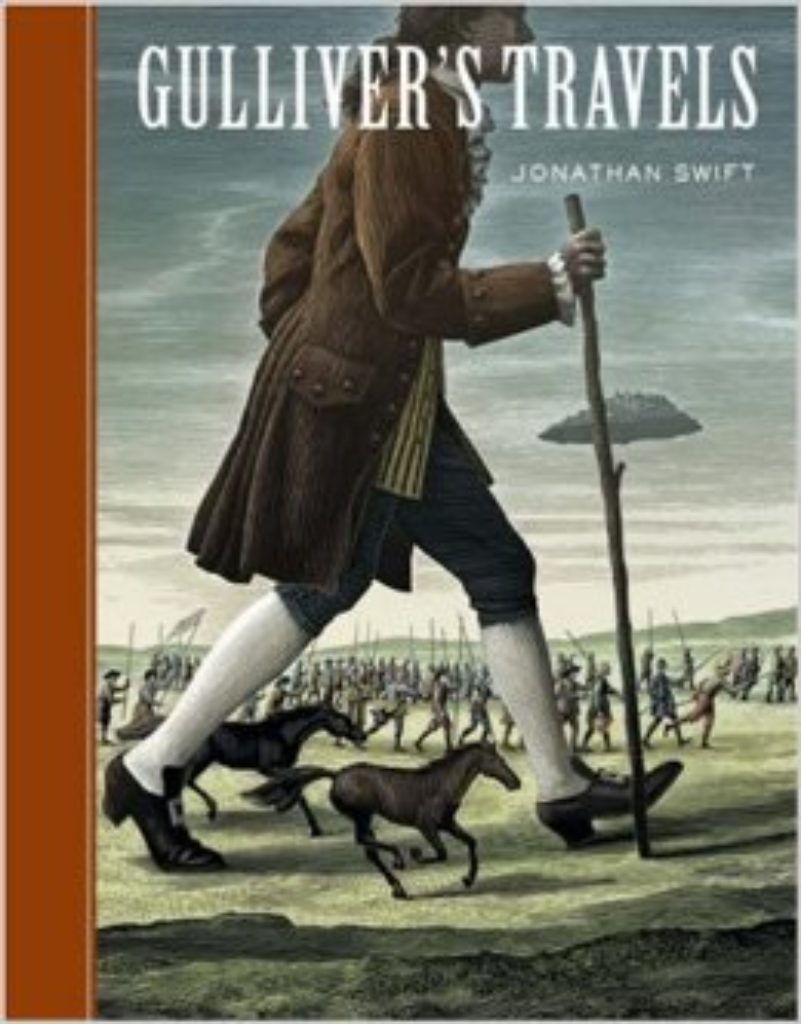This political satire by Jonathan Swift is published by Sterling Publishing and is written for adults but is sometimes studied by kids ages 16 and up.

This political satire by Jonathan Swift is published by Sterling Publishing and is written for adults but is sometimes studied by kids ages 16 and up.
Lemuel Gulliver is a ship surgeon whose voyages frequently end in shipwreck. He washes up on various islands where he meets, among others, tiny people called Lilliputians, giant Brobdingnagians, a race of horses morally superior to man known as Houyhnhnms, and the repulsive Yahoos who closely resemble humans. Jonathan Swift wrote the book as a satirical commentary on the political and social conduct of his day.
If a Lilliputian doesn’t believe in “divine Providence,” he cannot hold a public office. The people of the islands Gulliver visits have holy men and religious rituals. There are a few brief mentions of the Christian faith, mainly as Gulliver enlightens his masters about European belief systems.
Lilliputians believe the earth is flat and that people would be resurrected when the earth flips over. Therefore, they bury their dead upside down so that when they rise from death, they’ll be upright. Lilliputian children are removed from their families at infancy and raised by public institutions. The people of Laputa believe the stars play a major role in human affairs, and they are deeply concerned about the health of the sun as it relates to their survival. The island of Glubbdubdrib is named for its people, who are sorcerers. There, Gulliver is given the opportunity to conjure up spirits of many historical figures. Gulliver expresses his desire to be like the Struldbruggs, who live forever on earth.
Most of the leaders Gulliver encounters are eager to learn more about his and generally treat him with respect. They are frequently perplexed, however, by his stories of human wars, weapons, excesses, deceit and man’s general treatment of one another. Gulliver’s first master in Brobdingnag tries to exploit him by forcing him to speak to the point of exhaustion before audiences. Although Gulliver loves living with the Houyhnhnms, he is eventually forced to leave because those in power believe him to be a vile Yahoo.
None, per se, but Gulliver makes frequent references to urination and defecation. A few examples: In Lilliput, he angers a member of the royal family by urinating on her burning home to put out the fire. In Brobdingnag, Gulliver tries (and fails) to jump over a pile of dung. He is bothered by the torrential sound of the Brobdingnagians’ urination. On a later journey, he meets a researcher who attempts to create food from human waste. Gulliver often mentions private body parts. For example, he asks that the Lilliputians avert their eyes when walking under his legs, and he talks about the Brobdingnagian women stripping him naked and having him walk on their bare breasts.
The word anus appears a half-dozen times. One Laputan scientist attempts to cure a disease by inserting an apparatus there, and Gulliver describes the Yahoos as vile creatures with hair around the anus.
Gulliver discovers that many of the historical characters he conjures up are whores, pimps and sodomites, some of whom are involved in incest or prostitute their own wives and children. Gulliver tells the Houyhnhnms about the excesses and unhealthy behavior of humans, including prostitution and its related diseases. Gulliver also comments on the Yahoo females’ aberrant sexual behavior, and he mentions how one, whom he believes to be about 14 years old, threw herself at him after seeing him bathe in the river.
If your children have read this book or someone has read it to them, consider these discussion topics :
Lying is so foreign to the Houyhnhnms that they don’t even have a word for it.
What do you think our society would be like if lying didn’t exist?
Gulliver initially thinks that being immortal like the Struldbruggs would be wonderful. The people of the Laputa nation inform him otherwise.
Would you like to live without dying?
What would you do with your time?
How would living forever on a new earth with Jesus be better?
What do you think are some of the most valuable things Gulliver learns on his journeys?
By the end of the book, Gulliver is convinced that he and all humans are descended from Yahoos.
Can you name any aspects of the Yahoos that are similar to human traits or behaviors?
Which of the places Gulliver visits would you most like to see? Why?
Why do you think the book spends so much time discussing excrement and private body parts?
Did that bother you, or did you think there was a purpose for it? Explain your answer.
Book reviews cover the content, themes and world-views of fiction books, not their literary merit, and equip parents to decide whether a book is appropriate for their children. A book’s inclusion does not constitute an endorsement by Focus on the Family.
You can request a review of a title you can’t find at [email protected].